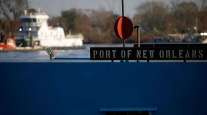Senior Reporter
Louisiana Transportation Chief Backs State’s Push for Fuel-Tax Increase

A boost in road funding stemming from a possible increase in fuel taxes would help improve the flow of goods along Louisiana’s busy, multimodal freight corridors, the state’s chief transportation officer said this month on Capitol Hill.
“We’re focusing on improving our corridor and our system,” Shawn Wilson, secretary of the Louisiana Department of Transportation & Development, said May 17 at an event hosted by the American Association of State Highway and Transportation Officials.
“As much as we talk about freight, and growing and going to a freight economy, if we don’t think about how do we better preserve our systems — that’s a real majority component of where freight is going to be going. It’s on our existing systems,” Wilson added.
RELATED: Louisiana's long shot push for gas tax hike faces first crucial hearing
Louisiana lawmakers are considering a high-profile bill that would increase the state’s diesel and gasoline tax by 17 cents per gallon. A vote to decide whether to clear the bill for the governor’s approval could occur as early as next month.
The state’s fuel taxes are 20 cents per gallon and have not been raised in more than two decades. Proponents of the legislation estimate the tax increases would raise $539 million in their first year.
Wilson stressed a need for revamping the state’s transportation network to handle growing demands along trucking corridors, rail operations, and coastal and inland waterways. “We’ve been a department of transportation for a number of years. We have not been a department of highways necessarily from a policy perspective,” he said, adding that traffic congestion along major freight corridors and at ports hinders commerce.
Improving Louisiana’s roads, bridges and ports would help attract commerce and new businesses to urban regions and rural industrial parks, Wilson said.
RELATED: Bill to hike Louisiana's gas tax by 17¢, raise $510 million, clears house committee
The secretary’s sentiment is one that is shared by the business community through chambers of commerce statewide, as well as the freight sector, which applauds the efforts to raise revenue for infrastructure improvements.
Congestion nationwide resulted in operational costs to the trucking industry of more than $63.4 billion in 2015, according to a report by the American Transportation Research Institute.
Opponents of the legislation reject the proposition of having to pay more at the gas pump.
Three years ago, Louisiana lawmakers formed a task force charged with finding viable sources of funding for large-scale transportation projects to improve the flow of freight and traffic in the region. Among their conclusions was raising taxes on fuel.
For the trucking industry, the Pelican State is a critical distribution point for carriers traveling to ports around the Gulf of Mexico and along the Southeast. A 2017 report by the American Society of Civil Engineers found that nearly 13.5% of Louisiana’s bridges need to be rehabilitated. It also found that 14.7% of bridges no longer meet current design standards. Roads in poor or inadequate condition cost drivers an estimated $6.5 billion in repairs to their vehicles, or about $1,800 to $2,400 per motorist in major urban areas.




